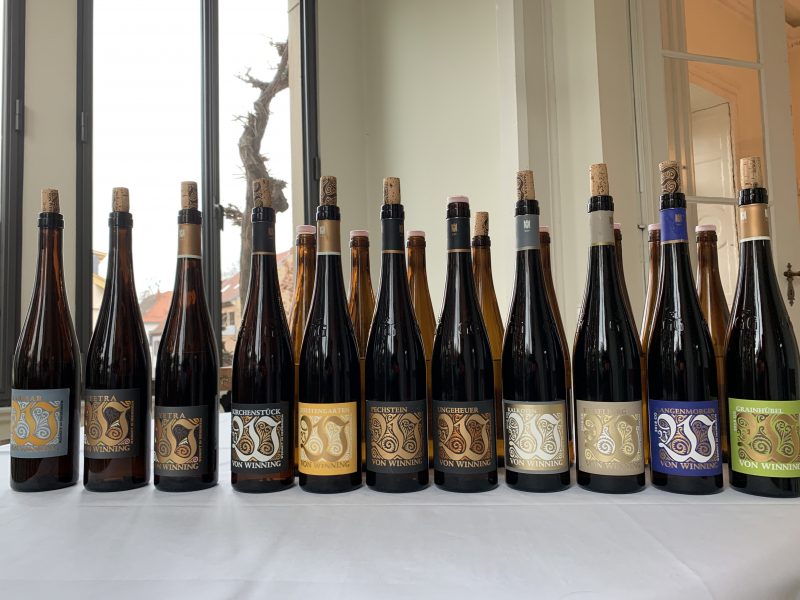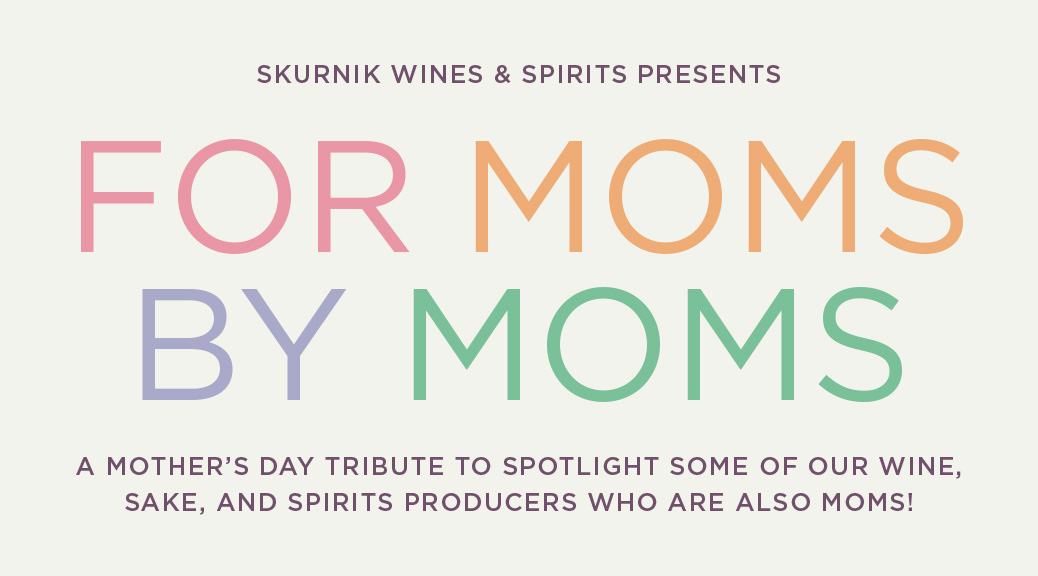In early March we tasted at von Winning in Deideshiem (Pfalz) with Director Stephan Attman and Deputy Winemaker Andreas Huetwohl. It was marathon tasting of over 50 wines from the current collection, the highlight of which were the 2018 Grosse Gewächse or GGs. These are some of the finest wines we’ve tasted from this domaine and 2018 vintage marks the 10th year that we’ve offered these wines. Today, they represent some of the most exciting wines in Germany and the most sought after bottlings we offer.
Stephan and Andreas introduced us to Joachim Jaillet, the vineyard manager who has been with the domaine from the start, joining in 2007. Stephan described Jaillet as “an absolute genius”, comparing him to legendary viticulturist and winemaker Hans-Günter Schwartz. “I think divine forces brought me together with this guy. It is the work of Jaillet in the vineyard (practicing biodynamic, organic viticulture) that makes the winemaking (natural ferments, élevage on gross lees until bottling) possible,” said Attman.
THE GG SITES: FORST + DEDIESHEIM
 The differences between the villages of Forst and Dediesheim, where the GG sites are located, are on full display. Deideshiem shows the ripe sunny character of the village, with pit-fruits and a lighter, more saline minerality. Forst, on the other hand, shows the classic smoky, stony, and darker toned minerality with a higher level density and power. The 2018 vintage shows detail and delineation of each of the separate sites, throwing into sharp relief the differences in exposition and soil between each of the single vineyards.
The differences between the villages of Forst and Dediesheim, where the GG sites are located, are on full display. Deideshiem shows the ripe sunny character of the village, with pit-fruits and a lighter, more saline minerality. Forst, on the other hand, shows the classic smoky, stony, and darker toned minerality with a higher level density and power. The 2018 vintage shows detail and delineation of each of the separate sites, throwing into sharp relief the differences in exposition and soil between each of the single vineyards.
All of the wines show a level of noble reduction (if you’re stuck your nose in a glass of PYCM or Roulot, you’re familiar with this aroma) and tons of complexity and structure, while at the same time not having the feeling of being overloaded, stuffed, or forced. They are disturbingly drinkable, even in their infancy, though five years of aging will start to show just how well these wines will develop. The aging potential here is deep and these wines will reward patient drinkers as well as those that thirst for the primary character of young, dry Riesling.
VITICULTURE + VINIFICATION
The GG sites are farmed biodynamically and the fruit for these wines is pressed gently after 12-24 hours of maceration, depending on site and character. The must flows by gravity directly into the cellar where it’s put into mostly 500-liter used (2nd, 3rd, & 4th use) oak barrels. Fermentations are natural here and last up to 8 months. When we visited in March 2020 there were a small number of barrels from the 2019 vintage which were still fermenting. “They will finish in spring and we are absolutely not worried about this” remarked Attman. It’s very important to note that the wines are not racked off the gross lees until bottling when the assemblage of each vineyard is made by blending barrels together. It’s as low intervention as possible, “controlled idleness” in the cellar.
We tasted through the very young barrel samples of the 2019 vintage; the potential here is great, but the quantity of 2019 GGs, which will be released in early 2021, will be very small.
THE WINES

Von Winning 2018 Grainhübel (Deidesheim) Riesling GG
The name means “sandy bay”, referencing its soil – sandy loam over red sandstone, with layers of limestone. This is a south-facing vineyard, sloping south towards the village, with the walls and houses of Deideshiem at the base of the slope. This equates to less movement of air and more direct sun and more solar radiation.
The nose shows a very nice noble reduction, ripe lime, and citrus aromas. Ripe white peach, a juicy structure built on fruit. In the background, there are toasted coconut and more exotic flavors before the wine tightens and moves into the finish. It’s young, but impressive already. Grainhübel shows finesse for the level of ripeness broader texture than some of the other GGs.

Von Winning 2018 Kalkofen (Deidesheim) Riesling GG
Kalkofen means literally “chalk-oven” and this is a slightly south sloping plateau just above the south-facing Grainhubel. Here, the soils are clay and marl over limestone. Kalkofen has a more quiet nature right now, though the wine feels deeper and firmer in structure than Grainhubel.
It is one of the finest textured of the GGs; it’s not as powerful or overt as some. It leans in the more filigreed direction, suffused with chalky and stony flavors.

Von Winning 2018 Langenmorgen (Deidesheim) Riesling GG
Langenmorgen translates to “long morning”. A “morgen” was an old measure of size, referring to the amount of land that one could work with a horse in a single day, about .1 hectare. This is a small section inside of the Paradiesgarten 1er Lage (1er Cru) and is the best section. With this vintage, a noble reduction seems to be a hallmark of the year.
Langenmorgen shows the intense ripeness, rich, and aristocratic. It certainly shows a richness of fruit – orange and red peach, but it’s not simply about fruit. There is a hint of iodine and almond, a structured, ripe acidity.

Von Winning 2018 Kieselberg (Deidesheim) Riesling GG
Kieselberg means “gravel mountain” and this vineyard is on a plateau above Deidesheim. Full sun exposure leads to a high level of ripeness, but in 2018, it shows a more savory character than Langenmorgen, for example.
The fruit shows the classic pit fruits here, ripe yellow peach and apricot, but the herbal, flinty character of the site is also apparent. The soils here are sandy loam with gravel and pebbles over sandstone.

Von Winning 2018 Ungeheuer (Forst) GG
Ungeheuer means “monster”, but the name comes from a previous owner’s family name – the town clerk for Forst, Johann Adam Ungeheuer in Deidesheim in the 17th century. Ungeheuer is a larger site and varies in soil. Here, loess and loam interspersed with sand and clay over limestone; this area was underwater millions of years ago and a fossilized coral reef sits below the topsoil. There is volcanic basalt here, typical of Forst, as well as sandstone.
Often the most open of any of the sites in Forst, this year’s Ungeheuer shows a lightly smoky mineral character with a firmer structure than the wines of Deidesheim.

Von Winning 2018 Pechstein (Forst) Riesling GG
Pechstein means “tar-stone”, with the name coming from the black, volcanic basalt in the vineyard. This site borders Ungeheuer and faces south-east, with sand and loam over sandstone and basalt sub-soils.
Reduction and aromas of herbs and wood smoke. From the second it hits the palate, shows a structure that feels architectural, full of gorgeous, intricate detail. The 2018 has a serious side, tightly knit and packed, but remains delicious and lip-smacking.

Von Winning 2018 Jesuitengarten (Forst) Riesling GG
The “Garden of the Jesuits” owned by a monastery in Neustadt. Jesuitengarten is the second smallest site in Forst and the second highest rated according to the 1828 classification – only Kirchenstück is more highly-rated. Jesuitengarten is an east-facing slope, with sand and loam over high concentrations of basalt.
The Jesuitgarten shows it’s youth and power here and of all of the wines tasted, needs time – with 20 minutes in the glass, the characteristic spiciness that this vineyard brings.





